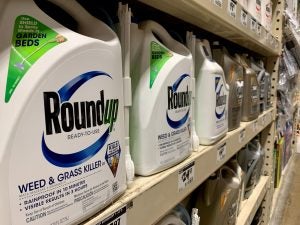Dad encountered the glyphosate smear machine while paying rent checks. The landlord in question has a farming background, isn’t prone to conspiracy theories, and is normally quite rational. But he asked dad whether there was an alternative herbicide to Roundup that Dad could use, because he’s heard some pretty bad stuff about glyphosate.
This concern should send chills down our spines. Because it no longer lingers on society’s fringes where people are prone to conspiracy theories about “Big Ag” and “Big Chemical.” Glyphosate fears have officially sprung up in our small rural communities with people who understand agriculture.
The campaign against glyphosate started a few years ago. The fairly benign herbicide was so closely tied to Roundup Ready crops it became inexorably tied to biotechnology. Activists tried hard to ban cultivating GMO crops. And they attempted to impose scary skull-and-crossbones labeling. But when bans failed and the federal government passed national labeling requirements, their focus shifted to more and more to glyphosate.
Their efforts paid off when the World Health Organization’s International Agency for Research on Cancer designated glyphosate as a probable carcinogen. The decision was immediately controversial and decried by scientists around the world. And we now know IARC’s committee was stacked with particular people set to make sure it found a particular result.
After IARC’s announcement, regulatory agencies around the world decided to review their positions on glyphosate. Every single one concluded IARC was wrong. These have included the U.S. Environmental Protection Agency, the European Food Safety Authority, the Canadian Pest Management Regulatory Authority, and the European Chemical Agency. Even the World Health Organization stated IARC got it wrong.
Most recently, Canada Health released a statement on its review of glyphosate. The statement reads: “Currently, no pesticide regulatory authority, including Health Canada, considers glyphosate to be a carcinogenic risk of concern to humans.”
Scientists have even conducted additional research on glyphosate and its potential link to cancer. In November 2017, the Journal of the National Cancer Institute published a large long-term study that found no link between exposure to glyphosate by agricultural workers and cancer.

But IARC’s decision had consequences. In August 2018, a California jury awarded Dewayne Johnson a multi-million dollar verdict. Johnson claimed his exposure to glyphosate during his job as a school’s groundskeeper caused him to develop lymphoma. He based his claims on IARC’s decision. There are now over 5,000 other lawsuits pending against Bayer’s Monsanto with similar claims. And now television commercials airing around the country urge potential plaintiffs to contact class-action law firms to get in on the action.
These developments aren’t the product of some random coincidence. I’ve long warned “Big Green” knows exactly what they’re doing and that we shouldn’t underestimate them. These activist organizations, like the Environmental Working Group and the Organic Consumers’ Association, are rich, organized, and powerful. What they’ve accomplished in just a few short years against glyphosate should remind us of their capabilities.
On a positive note, we now have a better grassroots effort to speak directly to consumers, shoppers, and eaters. And more people are now aware of how these organizations operate, and how they win. I hope next time — and there will definitely be a next time — our side is a little more successful.
Amanda Zaluckyj blogs under the name The Farmer’s Daughter USA. Her goal is to promote farmers and tackle the misinformation swirling around the U.S. food industry.



